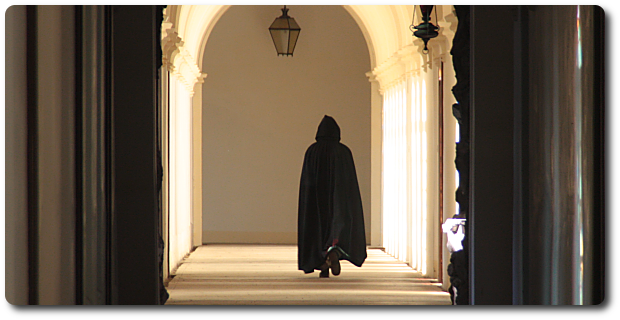
History
The Carthusian
Order Today
Structure
of the Order
Spirituality
Role in the Church
Fathers
Brothers
Liturgy
Community
Daily Schedule
and
Novitiate
Texts
Visit
Products

When God Calls...God calls in very different ways. A reliable sign of a vocation is if one feels in his heart God’s invitation to surrender himself to God alone. An invitation is not a command! Just as in marriage the decision involves both concerned, so a response to a religious vocation must be made in a spirit of freedom and generosity.Where is God Calling?Many people decide to follow God’s call to a special closeness with Him. This does not necessarily mean that God is calling one to the Charterhouse, however. For a Carthusian vocation it is necessary to also feel a longing for life devoted to prayer and silence alone, or a clear, though often not understood call to just this Carthusian order.Father or Brother?The candidate must decide before entering whether for the life as a Father or as a Brother. The Lord's calling to one or the other may be known above all by the gifts that He has given him, and by the interior inclination of heart. The signs of a Father's call are: a leaning to a stricter exterior solitude, an openness and ability for priesthood, the ability to occupy oneself in cell, an inclination toward studies, an ear for singing; whereas, for the Brother's calling: ability and inclination toward manual labor, a leaning toward a humble and hidden life and a greater simplicity and freedom in prayer, a feel for calling in concrete cervice to con-freres. The Fathers resemble more Jesus whilst at solitary prayer in the hills and the Brothers more Jesus in His hidden life in Nazareth.AptitudeIn the first place a candidate must be a practicing Catholic with a well ordered religious life and at least a fundamental education in the Faith. Furthermore, he must be physically and mentally healthy, have an aptitude for solitude as well as for life in common and be ready to fulfill all those obligations dictated by his state or imposed upon him by his superiors. Among the qualities, with which candidates for life in solitude should be particularly endowed, a sound and balanced judgment is of prime importance. Candidates younger then 20 years and older then 45 years we normally don't receive. Besides this, a candidate for cloister monk is required to have an education sufficient for a monk destined for the priesthood; singing ability; and sufficient knowledge of Latin, which he must attain before entering the novitiate.AdmittanceIf one feels called to the Carthusian life, one may write to the Master of novices (Father Master). He will arrange for an eventual visit to the Charterhouse and then, a longer trial within the monastic framework. If the candidate decides to enter the monastery, the Novice Master and Prior decide regarding his ascceptance. Several days after entering, the candidate receives the black cloak and cap of a postulant, which is worn during the common liturgy. The postulancy lasts at least three months and not longer than one year. After this, if he perseveres in his resolution, the postulant asks in chapter to be received “for probation in the monastic habit, as the most humble servant of all”. The community then votes in secret on his acceptance, while the final decision rests with the Prior. Such a petition and voting accompanies each subsequent step in monastic formation.NovitiateDuring the novitiate, which lasts for two years, the novice wears a white habit with a shorter scapular and during liturgy in common the black cloak as well. While retaining ownership of their property until solemn vows, one does not keep anything personal for themselves in cell so as to better follow the poor Christ. Brother candidates choose between the life of a converse or donate toward the end of the first year in the novitiate. Father novices begin theological studies in their second year, which take place in the monastery and are tailored to our way of life.ProfessionAt the end of the novitiate the monk makes his first profession of vows of stability, obedience and conversion of life for three years. The fathers remain during this time under the direction of the Novice-Master, while the brothers do so until their solemn vows. After three years the vows are renewed for an additional two years, after which, if approved, one is admitted to solemn vows which are binding until death. Our rule says that before one makes such a decision with vows “he should first sit down and consider whether he really wants to yield himself to God forever” (30,1). Although such an irrevocable public commitment only occurs after a probation of seven years and during the two years of novitiate the novice is free to leave at any time, still, Jesus’ words are valid upon entering: “No one who puts his hand to the plow and looks behind is worthy of the Kingdom of God”. To enter the Charterhouse with the mere intention of trying it out would be to deny oneself the essence of Carthusian life, which is in surrendering oneself unconditionally to God. |  Address: Kartuzija Pleterje Drča 1 8310 Šentjernej Slovenija Tel: +386 (0)7 30 81 225 E-mail:  Web site of the Grande Chartreuse: www.chartreux.org |
